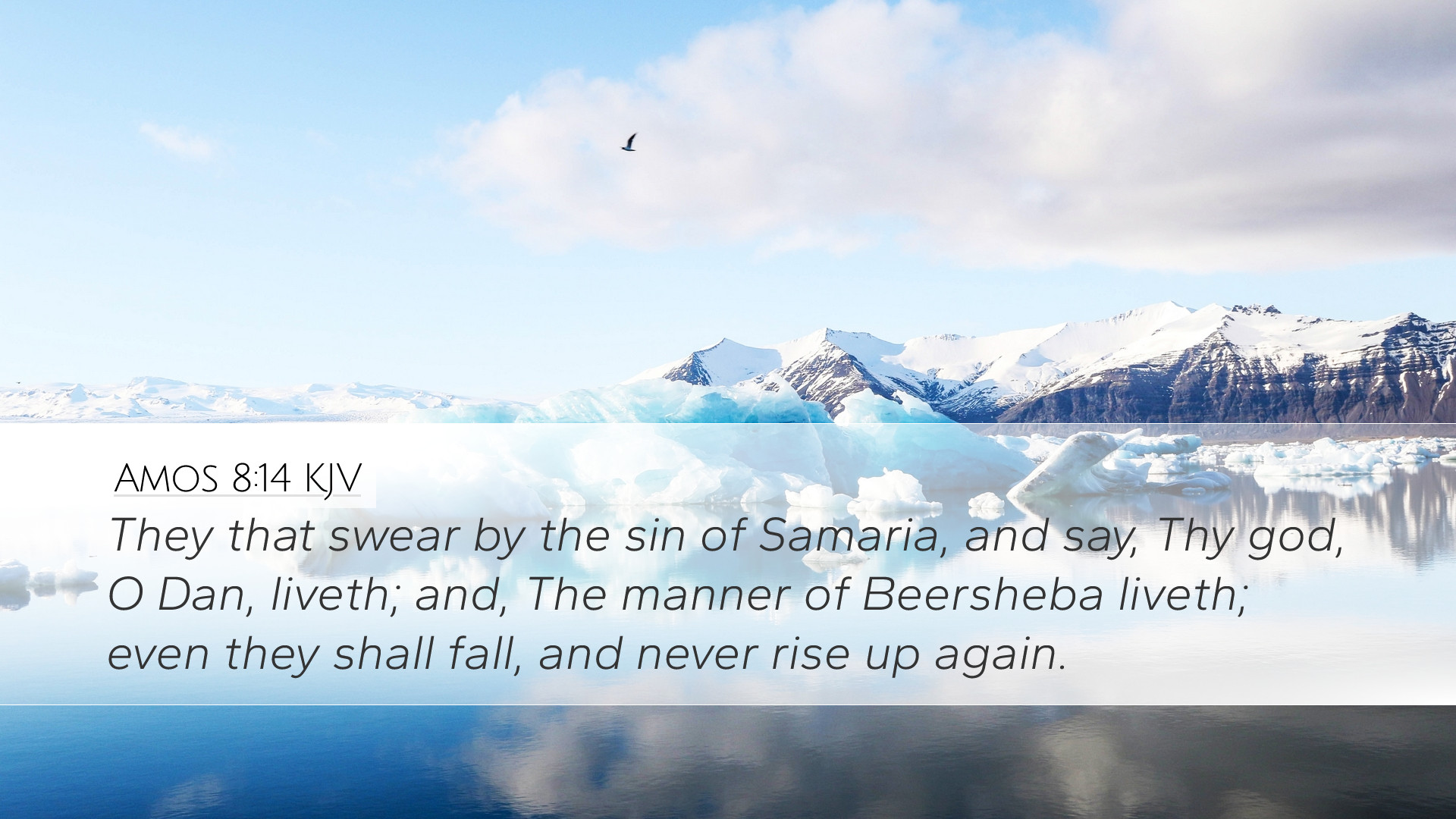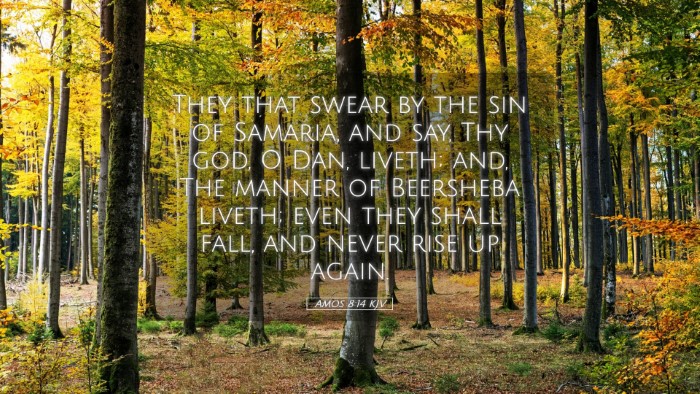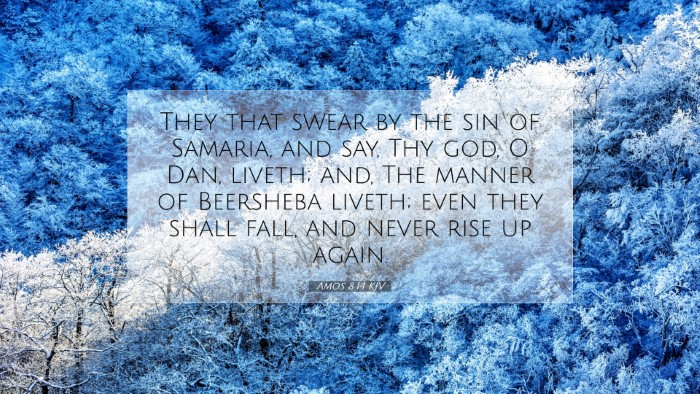Old Testament
Genesis Exodus Leviticus Numbers Deuteronomy Joshua Judges Ruth 1 Samuel 2 Samuel 1 Kings 2 Kings 1 Chronicles 2 Chronicles Ezra Nehemiah Esther Job Psalms Proverbs Ecclesiastes Song of Solomon Isaiah Jeremiah Lamentations Ezekiel Daniel Hosea Joel Amos Obadiah Jonah Micah Nahum Habakkuk Zephaniah Haggai Zechariah MalachiAmos 8:14
Amos 8:14 KJV
They that swear by the sin of Samaria, and say, Thy god, O Dan, liveth; and, The manner of Beersheba liveth; even they shall fall, and never rise up again.
Amos 8:14 Bible Commentary
Commentary on Amos 8:14
Verse Context: Amos 8:14 states: "They that swear by the sin of Samaria, and say, Thy god, O Dan, liveth; and the manner of Beersheba liveth; even they shall fall, and never rise up again.” This verse encapsulates the themes of idolatry and divine judgment that permeate the book of Amos.
Introduction
The book of Amos, set against the backdrop of the Northern Kingdom of Israel during a time of prosperity, issues a prophetic warning about moral decay and impending judgment. The prophet Amos critiques the prevalent idolatry and spiritual complacency that coexisted with national wealth, emphasizing the dire consequences for a people who forsake the true God.
Public Domain Commentary Insights
Matthew Henry's Commentary
Matthew Henry highlights the serious nature of idolatry referred to in Amos 8:14, noting that the “sin of Samaria” represents the collective apostasy of Israel. The swearing by the sin indicates a deep-rooted corruption among the people, confirming their allegiance to false gods rather than the God of Israel. Henry emphasizes:
- The gravitas of false worship: The mention of Dan and Beersheba exemplifies the locations of significant idolatrous worship, contrasting with the worship of Yahweh.
- The inevitability of judgment: Henry asserts that such transgressions will lead to inevitable judgment, as those who forsake the true God will find themselves without hope.
Albert Barnes' Notes on the Bible
Albert Barnes elaborates on the phrase "they that swear by the sin of Samaria," interpreting it as an acknowledgment of the corrupted practices of the kingdom. He states:
- National Apostasy: Barnes notes that the people had committed themselves to the worship of golden calves established in Dan, which led them to further apostasy.
- Consequences of Idolatry: The comment highlights that swearing by these idols signifies a complete rejection of the covenant relationship with Yahweh.
Adam Clarke's Commentary
Adam Clarke provides a detailed examination of the phrase, emphasizing the cultural and historical implications of the worship practices. He asserts:
- The sin of Samaria: Clarke interprets this as a metaphor for the broader idolatrous practices that had infiltrated Israel, springing from a political and spiritual uprising against God.
- Fall from Grace: He profoundly notes that those who engage in this idol worship are destined to “never rise up again,” indicating finality in their judgment, as they choose death over vibrancy found in true worship.
Theological Implications
This verse serves as a stark warning about the dangers of syncretism, where the blending of true worship with idolatry leads to spiritual bankruptcy. Each commentator notes that the act of swearing allegiance to false gods signifies a profound rejection of the covenantal relationship established by God with His people.
Furthermore, Amos 8:14 reflects the profound societal issue of misplaced trust. The Israelites’ reliance on idols—whether in the form of physical objects or entrenched cultural norms—highlights an inability to see the futility in such practices. As noted by Henry, Barnes, and Clarke, the consequence is severe: the imminent fall of those who pursue such paths.
Application for Today
For pastors and theologians, Amos 8:14 serves as a poignant reminder of the continuous struggle against idolatry in contemporary contexts. Idolatry might take different forms today—including materialism, nationalism, or even secular ideologies—that allure believers and distract them from true worship.
Moreover, the urgency of Amos's message calls for introspection within the church, urging believers to evaluate how societal practices and cultural norms may challenge or compromise their fidelity to Christ. In times where the Church may appear prosperous, this verse reminds leaders to discern the spiritual climate and resist the tempting allure of culturally accepted practices that may not align with biblical orthodoxy.
Conclusion
Amos 8:14 encapsulates a critical message about the dangers of idolatry and divine judgment against spiritual complacency. Insights gleaned from public domain commentaries reveal the historical and theological depth of the text, reminding readers of the consequences faced by those who stray from true worship. This call to fidelity serves as a vital reminder for all who seek to maintain a true relationship with God amidst a culture filled with distractions and false allegiances.


